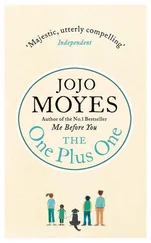Mrs. O’Grady was perhaps fifty-two years old, with a trim, spare figure, and a devilish twinkle in her green eyes. She had been doing business with the merchants along Doyer Plains Avenue for five years now because she liked their prices and their goods better than those available in her own neighborhood. If you had asked either Mrs. O’Grady or Sal Palumbo about the casual flirtation that had been going on between them for the past five years, both would have said you were out of your mind. Palumbo was married, with two grown married sons and with three grandchildren. Mrs. O’Grady was married, with a married daughter who was pregnant. But Palumbo was a man who liked women in general, not only southern Italian types like his wife, Rose, with her dark hair and her darker eyes, but even trim little types with small compact breasts and tight small backsides and green eyes like Mrs. O’Grady. And Mrs. O’Grady was a passionate sort who liked nothing better than a good strong man in her arms, and this little fellow Sal Palumbo had good strong arms and a great massive chest with curling black hair showing at the open throat of his shirt. And so the two of them bandied small talk over the fruit, carrying on a flirtation that would never be openly recognized, that would never come to so much as a touch of the hand, but that nonetheless flared once a week every Tuesday over the pears and the apples and the plums and the peaches.
“Well, it don’t look so good to me today, Sal,” Mrs. O’Grady said. “Is this all you’ve got?”
“What’s the matter with you?” Palumbo demanded, his voice carrying only the faintest trace of an accent. “Those are beautiful fruit. What do you want? You want some nice pears today? I got some apricots, too, the first of the season.”
“And bitter as poison, I’ll bet.”
“From me? Bitter fruit from Sal Palumbo? Ah, bella signora, you know me better than that.”
“What are those melons?”
“What are they but melons? You see them with your eyes, no? You just named them. They’re honeydew melons.”
“Good?”
“Beautiful.”
“How do I know?”
“Mrs. O’Grady, for you I would slice one open, but only for you, and only because when I slice it open you’ll find a melon so sweet, and so ripe, and so green as your own eyes.”
“Never mind my own eyes,” Mrs. O’Grady said. “And you don’t have to slice it for me, I’ll take your word. No plums yet?”
“We can’t rush the summer,” Palumbo answered.
“Well, let me have two pounds of the apples. How much are the apricots?”
“Thirty-nine a pound.”
“That’s too high.”
“I’m losing money.”
“I’ll just bet you are,” she answered, smiling.
“These have to be shipped in, you know. Refrigerator cars. The grower makes money, the shipper makes money, the railroad makes money, but by the time the apricots get to me, what do I make?”
“Well, give me a couple of pounds, so you can lose some more money.”
“Two?”
“I said a couple, didn’t I?”
“ Signora, in Italy, a couple is always two. In America, a couple can be three, four, a half a dozen. Ma che ?” He spread his hands and shrugged his shoulders, and Mrs. O’Grady laughed.
“Two pounds,” she said.
“You need some lettuce? I got nice iceberg and nice Romaine, whichever your heart desires.”
“The iceberg,” she said. “You know who has really good fruit?”
“Sal Palumbo has really good fruit,” he answered.
“No, the fruit man in my own neighborhood. And his apricots are cheaper.”
Palumbo, who was reaching over the crates stacked in front of his stand, reaching onto the slanting stand itself to the rear, where his apricots were piled in neat rows, said, “How much are his apricots?”
“Thirty-five cents a pound.”
“So then go buy his apricots,” Palumbo said.
“I would,” Mrs. O’Grady replied, “but he was all out of them when I got there.”
“ Signora ,” Palumbo said, “if I was all out of apricots, they’d be thirty-five cents a pound, too. You want them, si or no ?”
“I’ll take them,” Mrs. O’Grady said, her green eyes twinkling, “but it’s highway robbery.”
Palumbo opened a brown paper bag and dropped a handful of apricots into it. He put the bag on his hanging scale and was piling more apricots into it when the bullet came from the station platform above him, entering his head at a sharp angle from the top of his skull. He fell forward onto the stand. The fruit and vegetables came tumbling down around him as he collapsed to the sidewalk, the polished pears and apples, the green peppers, the oranges and lemons and potatoes, while Mrs. O’Grady looked at him in horror and then began screaming.
Carella and Meyer did not learn that an Italian fruit dealer named Salvatore Palumbo had been shot to death until they got back to the squadroom at 4:00 that afternoon of May 1. Up to that time, they had been poring over the records of Anthony Forrest and Randolph Norden at the university.
The records were puzzling and contradictory, and supplied them with almost no additional clues as to just what the hell was happening.
Anthony Forrest had entered Ramsey University as a business-administration major in the spring semester of 1937, when he was eighteen years old and a graduate of Ashley High School in Majesta. By the spring of 1940, which was when Blanche Lettiger enrolled at the university, he was entering his senior year. He had been only a fair student, averaging C for almost every semester at the school, barely qualifying academically for the football team. He was graduated 205th in his class in January 1941, with a BS degree. He had been a member of the ROTC while at the college, but he was not called to active duty until almost a year after graduation, when the attack on Pearl Harbor startled the world.
Randolph Norden had entered Ramsey University in the fall of 1935, when he was eighteen years old and a graduate of Thomas Hardy High in Bethtown. He enrolled as a liberal-arts major with intentions of eventually going on to Ramsey Law. In the spring of 1937, when Forrest entered the school, Norden was halfway through his sophomore year. In the spring of 1940, when Blanche Lettiger entered the school, Norden had already completed his three-year pre-law requirement and was in his second year of law school. He was graduated from Ramsey Law in June 1941, and he went into the Navy almost immediately after the attack on Pearl Harbor.
His records showed that Norden was an excellent student throughout his entire stay at Ramsey. He had been elected to the student council in his sophomore year, had made Phi Beta Kappa as a junior, was listed in Who’s Who in American Colleges and Universities, and—in law school—was a member of the Order of the Coif, as well as editor of the Ramsey Law Review.
A closer search of the records showed that Randolph Norden had never been in any of Anthony Forrest’s classes. Nor did it appear as though either of the men, one of whom was a graduating senior in 1940, the other of whom was in his second year of law school, had shared any classes with the entering freshman named Blanche Ruth Lettiger.
“So what do you make of it?” Carella had asked.
“I’m damned if I know,” Meyer had answered.
Now, entering the squadroom at 4:00 in the afternoon, they still did not have the answer. They stopped off in the clerical office and bummed two cups of coffee from Miscolo. A note on Carella’s desk told him that the BCI had called. It no longer seemed important to know the names of the criminals Randolph Norden had defended, but he dutifully returned the call anyway, and was talking to a man named Simmons when the other phone rang. Meyer picked it up.
Читать дальше












